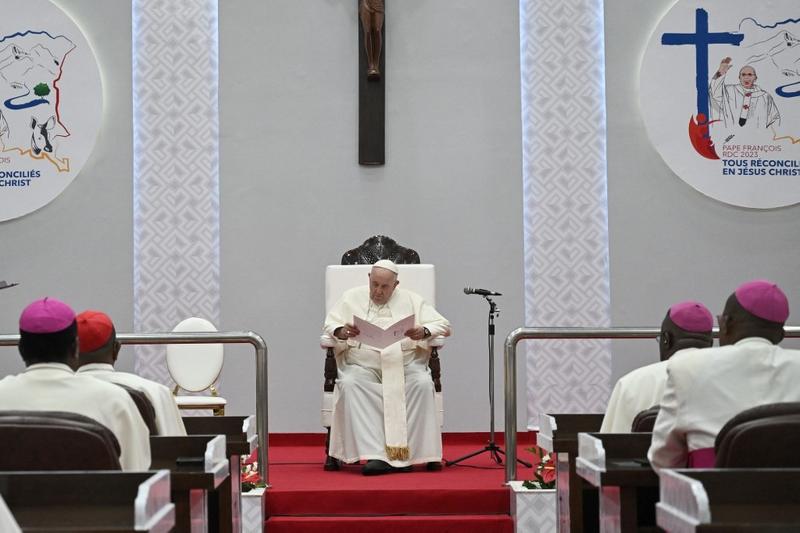 Pope Francis (center) attends a meeting with Bishops at the National Episcopal Conference of Congo (CENCO) in Kinshasa, Democratic Republic of Congo (DRC), on Feb 3, 2023. (PHOTO / AFP)
Pope Francis (center) attends a meeting with Bishops at the National Episcopal Conference of Congo (CENCO) in Kinshasa, Democratic Republic of Congo (DRC), on Feb 3, 2023. (PHOTO / AFP)
KINSHASA - Pope Francis on Thursday urged young people in Democratic Republic of Congo to forge a new future without the ethnic rivalry, corruption and distrust that have fueled so many bloody conflicts in Africa.
Addressing more than 65,000 young people in Martyrs Stadium, Francis spoke of forgiveness and reconciliation, themes that have dominated his visit to Congo, where armed conflict has killed and displaced millions of people over the past decades.
The speech was interrupted so often by applause and cheers that an organizer took a microphone and shouted "let the pope speak" before he could continue.
At one point, a large proportion of the crowd burst into a political chant in Lingala aimed at President Felix Tshisekedi: "Your mandate is over!". Tshisekedi, who did not appear to be in the stadium, is seeking a second term in office in elections scheduled for December.
While Pope Francis has made no comment that could be interpreted as taking sides in Congolese politics, he called in a speech on Tuesday for free, transparent and credible elections and said: "Power is meaningful only if it becomes a form of service."
While the pope has made no comment that could be interpreted as taking sides in Congolese politics, he called in a speech on Tuesday for free, transparent and credible elections and said: "Power is meaningful only if it becomes a form of service."
Thursday's speech at the stadium focused on what the pope called "ingredients for the future".
"To create a new future we need to give and receive forgiveness. That is what Christians do," he said.
Congo has been plagued by violence for decades, driven partly by the struggle for control of its vast mineral deposits, and partly by the complex fallout from the 1994 genocide in neighboring Rwanda.
"Beware of the temptation to point a finger at someone, to exclude another person because he or she is different; beware of regionalism, tribalism, or anything that makes you feel secure in your own group," Francis told young people in the stadium.
"You know what happens: first, you believe in prejudices about others, then you justify hatred, then violence, and in the end, you find yourself in the middle of a war," he said.
ALSO READ: Pope Francis presides over funeral of predecessor Benedict
Do the right thing
In urging the young people in the packed stadium to "do the right thing", Francis also asked them not to repeat the mistakes of previous generations. He singled out "corruption, which never seems to stop spreading".
He led the stadium in an impromptu chant of "no to corruption" in French, Congo's lingua franca.
The theme struck a chord with many in the crowd, who denounced their own leaders as corrupt and complained of routinely having to pay bribes for ordinary services.
"The pope is right," said Joel Muhemereri Amani, 21, an art student. "To enter somewhere you have to corrupt the police...I hope that the government, the police will change."
Genovic Lobombo, a medical student, said he had experienced corruption during his time at university. "In order to succeed, you have to give money," he said. "Corruption reigns here."
The United Nations says African economies lose nearly $150 billion to corruption each year.
READ MORE: Former Pope Benedict dies aged 95 in Vatican monastery
Minister of communication and government spokesman Patrick Muyaya said after the pope's speech that corruption was a scourge in many countries and there were structural problems, but the government would work to solve them.
The 86-year-old pope, who arrived in Congo on Tuesday, flies to neighboring South Sudan on Friday. He will be visiting jointly with the Archbishop of Canterbury and the Church of Scotland Moderator, in what the three Christian leaders have described as an unprecedented "pilgrimage of peace".
South Sudan, the world's youngest country, is also grappling with conflict and hunger following a civil war that was fought mostly on ethnic lines and killed 400,000 people.


